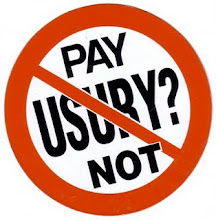Occupy the Neighbourhood: How Counties Can Use Land Banks and Eminent Domain

By Ellen Brown
"An electronic database called MERS (Mortgage Electronic Registration Systems) has created defects in the chain of title to over half the homes in America. Counties have been cheated out of millions of dollars in recording fees, and their title records are in hopeless disarray. Meanwhile, foreclosed and abandoned homes are blighting neighborhoods. Straightening out the records and restoring the homes to occupancy is clearly in the public interest, and the burden is on local government to do it. But how? New legal developments are presenting some innovative alternatives.
John O'Brien is register of deeds for Southern Essex County, Massachusetts. He is mad as hell and he isn't going to take it anymore. He calls his land registry a "crime scene." A formal forensic audit of the properties for which he is responsible found that:
Only 16 percent of the mortgage assignments were valid.
Twenty-seven percent of the invalid assignments were fraudulent, 35 percent were "robo-signed" and 10 percent violated the Massachusetts Mortgage Fraud Statute.
The identity of financial institutions that are current owners of the mortgages could be determined for only 287 out of 473 (60 percent).
There were 683 missing assignments for the 287 traced mortgages, representing approximately $180,000 in lost recording fees per 1,000 mortgages whose current ownership could be traced.
At the root of the problem is that title has been recorded in the name of a private entity called MERS as a mere placeholder for the true owners. The owners are a faceless, changing pool of investors owning indeterminate portions of sliced and diced securitized properties. Their identities have been so well hidden that their claims to title are now in doubt. According to the auditor:
What this means is that ... the institutions - including many pension funds - that purchased these mortgages don't actually own them....
The March of the Attorneys General
John O'Brien was thrilled when Massachusetts Attorney General Martha Coakley went to court in December against MERS and five major banks - Bank of America Corp., JPMorgan Chase, Wells Fargo, Citigroup and GMAC. Coakley says banks have "undermined our public land record system through the use of MERS."
Other attorneys general are also bringing lawsuits. Delaware Attorney General Beau Biden is going after MERS in a suit seeking $10,000 per violation. "Since at least the 1600s," he says, "real property rights have been a cornerstone of our society. MERS has raised serious questions about who owns what in America."
Biden's lawsuit alleges that MERS violated Delaware's Deceptive Trade Practices Act by:
Hiding the true mortgage owner and removing that information from the public land records.
Creating a systemically important, yet inherently unreliable, mortgage database that created confusion and inappropriate assignments and foreclosures of mortgages.
Operating MERS through its members' employees, whom MERS confusingly appoints as its corporate officers so that they may act on MERS' behalf.
Failing to ensure the proper transfer of mortgage loan documentation to the securitization trusts, which may have resulted in the failure of securitizations to own the loans upon which they claimed to foreclose.
This last allegation - that there are fatal defects in the loan documentation - may be even more conclusive than the MERS defect in establishing a break in the chain of title to securitized properties. Mortgage-backed securities are sold to investors in packages representing interests in trusts called REMICs (Real Estate Mortgage Investment Conduits). REMICs are designed as tax shelters; but to qualify for that status, they must be "static."
Mortgages can't be transferred in and out once the closing date has occurred. The REMIC Pooling and Servicing Agreement typically states that any transfer after the closing date is invalid. Yet few, if any, properties in foreclosure seem to have been assigned to these REMICs before the closing date, in blatant disregard of legal requirements. The whole business is quite complicated, but the bottom line is that title has been clouded not only by MERS, but because the trusts purporting to foreclose do not own the properties by the terms of their own documents.
Courts Are Taking Notice
The title issues are so complicated that judges themselves have been slow to catch on, but they are increasingly waking up and taking notice. In some cases, the judge is not even waiting for the borrowers to raise lack of standing as a defense. In two cases decided in New York in December, the banks lost although their motions were either unopposed or the homeowner did not show up, and in one, there was actually a default. No matter, said the court; the bank simply did not have standing to foreclose." (snip) ...
Read the complete article at this website:
http://www.truth-out.org/occupy-neighborhood/1326472096


0 Comments:
Post a Comment
<< Home